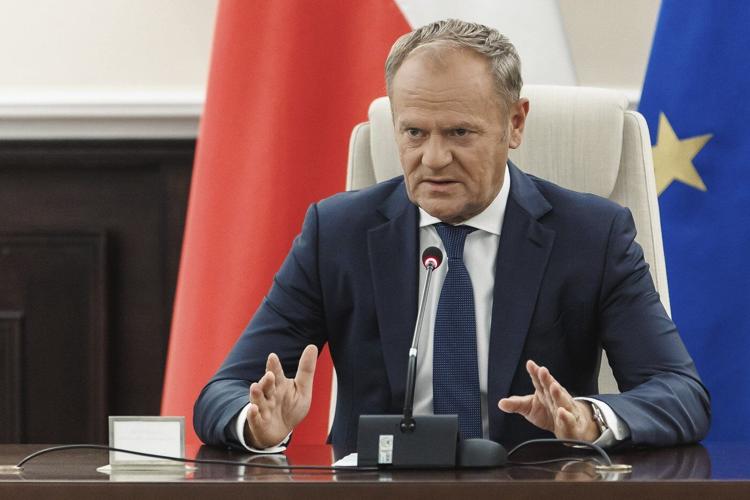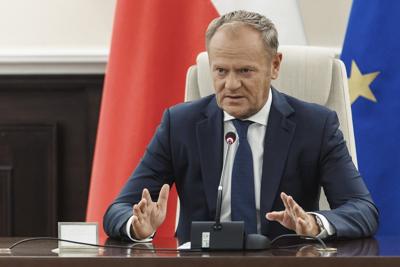WARSAW, Poland (AP) ÔÇö Poland said Wednesday that multiple Russian drones entered its territory over the course of several hours and were shot down with help from NATO allies, describing the incursion as an ÔÇťact of aggressionÔÇŁ carried out during a wave of Russian strikes on Ukraine.
RussiaÔÇÖs Defense Ministry it did not target Poland, but close ally, Belarus, said it tracked some drones that ÔÇťlost their courseÔÇŁ because they were jammed. However, several European leaders said they believe that the incursion amounted to an intentional escalation by Russia of its war on Ukraine.
Poland said some of the drones came from Belarus, where Russian and Belarusian troops have begun gathering for war games starting on Friday.
Polish airspace has been violated many times since RussiaÔÇÖs full-scale invasion of Ukraine in 2022, but there has been nothing on this scale in Poland or in any other Western nation along the eastern flank of NATO and the European Union. A NATO spokesman said it was the first time the alliance has confronted a potential threat in its airspace.
NATO met to discuss the incident, which came three days after RussiaÔÇÖs since the war began.
ÔÇťRussiaÔÇÖs war is escalating, not ending,ÔÇŁ European Union foreign policy chief Kaja Kallas said. ÔÇťLast night in Poland we saw the most serious European airspace violation by Russia since the war began, and indications suggest it was intentional, not accidental.ÔÇŁ
The extent of the incursion was still becoming clear: Polish Prime Minister Donald Tusk told parliament 19 violations were recorded over seven hours, but that information was still being gathered. Eight crash sites have been found, a government spokesperson said. Dutch fighter jets came to Poland’s aid and intercepted some drones, the NetherlandsÔÇÖ defense minister said.
ÔÇťThis is an act of aggression that posed a real threat to the safety of our citizens,ÔÇŁ the Polish militaryÔÇÖs operational command said on social media.
French President Emmanuel Macron called on Russia to put an end to ÔÇťthis reckless escalation,ÔÇŁ while Czech Prime Minister Petr Fiala called the violation ÔÇťa test of NATO countriesÔÇÖ defense capabilities.ÔÇŁ
Poland says some drones came from Belarus
Tusk told parliament that the first violation came at approximately 11:30 p.m. Tuesday and the last around 6:30 a.m. on Wednesday. He said that the 19 violations recorded so far were ÔÇťnot the final data.ÔÇŁ
Earlier, Defense Minister Władysław Kosiniak-Kamysz wrote on X that more than 10 objects crossed into Polish airspace, but he did not specify an exact number.
ÔÇťWhat is new, in the worst sense of the word, is the direction from which the drones came. This is the first time in this war that they did not come from Ukraine as a result of errors or minor Russian provocations. For the first time, a significant portion of the drones came directly from Belarus,ÔÇŁ Tusk said in parliament.
Russia’s Defense Ministry said that its overnight strikes targeted UkraineÔÇÖs military-industrial complex in the western regions of the country, with no planned targets on Polish territory.
ÔÇťWe are ready to hold consultations with the Polish Ministry of Defense on this issue,ÔÇŁ the statement said.
Belarusian Maj. Gen. Pavel Muraveiko, the chief of the General Staff chief and first deputy defense minister, appeared to try to put some distance between his country and the incursion.
In an online statement, he said that as Russia and Ukraine traded drone strikes overnight, Belarusian air defense forces tracked ÔÇťdrones that lost their courseÔÇŁ after they were jammed, adding that Belarusian forces warned their Polish and Lithuanian counterparts about ÔÇťunidentified aircraftÔÇŁ approaching their territory.
ÔÇťThis allowed the Polish side to respond promptly to the actions of the drones by scrambling their forces on duty,ÔÇŁ Muraveiko said.
Drones were found in seven locations in Poland, according to Karolina Galecka, spokeswoman for Ministry of Interior and Administration. At the eighth site, objects of an unknown origin were found.
Bernard Blaszczuk, mayor of the village of Wyryki in Lublin region, told TVP Info that a house was hit. Much of the roof was ripped off. He said people were inside but nobody was hurt.
On Wednesday morning, the army was keeping guard on the streets of the village as curious locals huddled together with police and firefighters to figure out what happened.
Poland closed part of its airspace for several hours, and WarsawÔÇÖs Chopin Airport suspended flights.
NATO members vow support, with Baltic countries rattled
NATO air defenses supported Poland in what spokesman Col. Martin OÔÇÖDonnell called ÔÇťthe first time NATO planes have engaged potential threats in Allied airspace.ÔÇŁ
Tusk told parliament consultations with allies were taking place under Article 4 of the NATO treaty - a clause that allows countries to call for urgent discussions with their allies. The consultations happened at a pre-planned meeting on Wednesday. They do not automatically lead to any action under Article 5, which is NATOÔÇÖs collective security guarantee.
Dutch F-35 fighter jets ÔÇťintercepted drones over Poland,ÔÇŁ Defense Minister Ruben Brekelmans said on X. And German Patriot defense systems in Poland were also placed ÔÇťon alert,ÔÇŁ and an Italian airborne early warning plane and an aerial refueler were launched, OÔÇÖDonnell said.
NATO, he said, ÔÇťis committed to defending every kilometer of NATO territory, including our airspace.ÔÇŁ
Leaders in the Baltic states of Lithuania, Latvia and Estonia ÔÇö the NATO members most nervous about Russian aggression given their close proximity ÔÇö were among the most rattled and expressed deep concerns.
ÔÇťRussia is deliberately expanding its aggression, posing an ever-growing threat to Europe,ÔÇŁ Lithuanian President Gitanas Naus─Śda wrote on X. Estonian Foreign Minister Margus Tsahkna said that the overnight attacks on Ukraine and violations of Polish airspace were ÔÇťyet another stark reminder that Russia is not just a threat to Ukraine, but to all of Europe and NATO.ÔÇŁ
Ukrainian President Volodymyr Zelenskyy called it an ÔÇťextremely dangerous precedent for EuropeÔÇŁ and called for Russia to ÔÇťfeel the consequences.ÔÇŁ
ÔÇťMoscow always tests the limits of what is possible and, if it does not encounter a strong response, remains at a new level of escalation,” he said. ÔÇťNot just one Shahed (drone), which could be dismissed as an accident, but at least eight attack drones that were aimed in the direction of Poland.ÔÇŁ
Objects have entered Polish airspace before
Poland has complained about Russian objects entering its airspace during attacks on Ukraine before.
In August, PolandÔÇÖs defense minister said that a flying object that crashed and exploded in a cornfield in eastern Poland was , and called it a provocation by Russia.
In March, Poland after a Russian missile briefly passed through Polish airspace on its way to a target in western Ukraine, and in 2022, a missile that was likely fired by Ukraine to intercept a Russian attack landed in Poland, killing two people.
Russian attacks hit central and western Ukraine
Meanwhile, UkraineÔÇÖs Air Force says Russia fired 415 strike and decoy drones, as well as 42 cruise missiles and one ballistic missiles overnight.
Ukrainian air defenses intercepted or jammed 386 drones and 27 cruise missiles, according to the report.
One person was killed and one injured in Zhytomyr region overnight, regional administration head Vitalii Bunechko wrote on Telegram, while homes and businesses were damaged.
Russian drones injured three people in UkraineÔÇÖs western Khmelnytskyi region, its head Serhii Tiurin wrote on Telegram early Wednesday morning. He said a sewing factory was destroyed, a gas station and vehicles were damaged, and windows in several houses were blown out.
In Vinnytsia region, Russian drones damaged ÔÇťcivilian and industrial infrastructure,ÔÇŁ according to regional head Natalia Zabolotna. Nearly 30 residential buildings were damaged and one person was injured.
The Russian Defense Ministry said in its morning report on Wednesday that it had destroyed 122 Ukrainian drones over various Russian regions overnight, including over the illegally annexed Crimea and areas of the Black Sea.
Novikov reported from Kyiv, Ukraine. AP writers Lorne Cook in Brussels and Geir Moulson in Berlin contributed to this report.
































